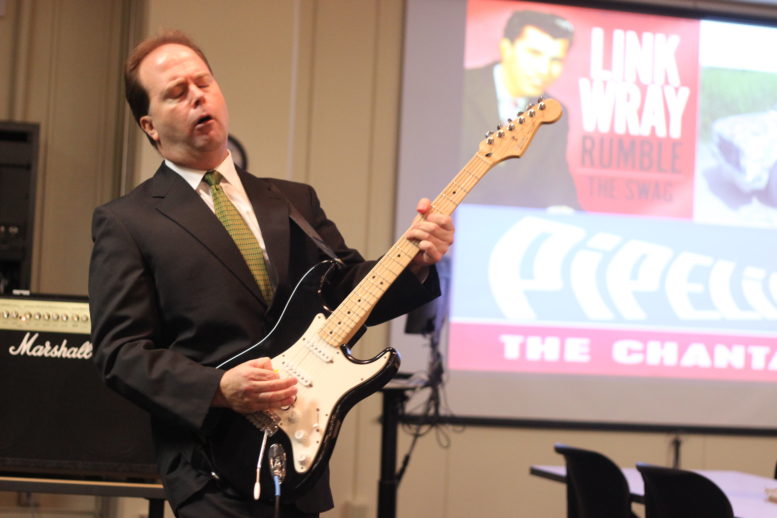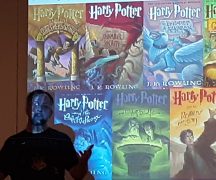By DAVID DUPONT
BG Independent News
Popular Culture Professor Matthew Donahue took listeners on a trip through the hit parade Thursday at Jerome Library on the Bowling Green State University campus.
His hot tracks weren’t just there because they were popular, but because they were also unpopular with authorities, pastors, parents, politicians, and even white supremacists.
Donahue’s presentation, “Popular Music Controversies and Banned Popular Music: The Ascent from Low Culture to High Culture,” in the Pallister Conference room was held in conjunction with Banned Books Week and to celebrate Jerome Library’s 50th anniversary.
Donahue’s trip down memory lane began at the dawn of the previous century when blues was labeled devil’s music, as was its close cousin, jazz. Maybe concerns about those styles provoking illicit coupling was warranted, since they gave birth, with some country added to the gene pool, to rock ‘n’ roll.
The emergence of rock ‘n’ roll opened a chasm between America’s teenagers and their parents and others.
Drawing on YouTube videos, Donahue showed one Rev. Jimmy Snow declaring that young people were marching on the road to hell to the beat of rock ‘n’ roll.
More sinister condemnation came from a member of the Alabama White Citizens Council, who said the music was intended to bring white children “down” to the level of African-Americans.
And the sartorial style inspired by the music drew the ire of middle school administrators in a clip about the dangers of tight skirts, snug fitting sweaters, unbuttoned shirts, “dungarees,” and leather jackets.
With the advent of television, the music – though critics often didn’t consider music at all – “brought rock ‘n’ roll into people’s living rooms.” That meant they witnessed the gyrations of Elvis’ pelvis.
Even the title of a song could get it banned as was the case with guitarist Link Wray’s “Rumble.”
And all this led to the Beatles. Donahue played clips showing the reaction to the band’s Cleveland show where 14,000 teenagers, mostly girls packed the auditorium. They were, the commentators said, intentionally whipped into a frenzy, some ripping their dresses, and some even slipping notes of an indecent nature onto the bandstand.
Later when John Lennon opined that the band was more popular than Jesus, another frenzy ensued. This one, spurred on by radio stations called for people to bring in their Beatles records and memorabilia to be destroyed.
Donahue said for collectors like himself and Bill Schurk, his mentor and retired archivist at the Sound Recording Archives, there’s a sadness in seeing what now would be valuable records stomped on.
The pattern, Donahue said, was the same: music got popular, there was a backlash, giving it more exposure.
As country singer Loretta Lynn noted, when her hit “The Pill” was on the charts radio stations had no choice to play it despite complaints.
The pattern remained through the years as one pop music style followed another. It held true for proto-punk band MC5 from Detroit and later punk the Sex Pistols, for their song “God Save the Queen.” They were even forced for a time to play under a different name.
In the 1980s, the Parents Music Research Center, a bipartisan group of Washington D.C. mothers, compiled its list of the “Filthy 15.”
That led to Senate hearings in which Dee Snyder, lead singer of Twisted Sister, was called to testify, and surprised the panel with his cogent defense of his work. He also insulted Sen. Al Gore by saying people read into the songs what they wanted to read into them. Gore’s wife, Tipper, a PMRC founder, wanted to hear about sadomasochism in a song he claimed was inspired by a dental operation.
A few years later it was political commentary in the rap song “Cop Killer” that caused a stir. While Warner Brothers records initially stood by Ice T, the record label was eventually “brought to its knees” by the relentless pressure.
Contemporary efforts to censor music, however, can result in brutal actions. In one province in Indonesia where the government has adopted laws based on an extreme reading of Islam, young punk fans are arrested. The authorities shave their heads, bath them in a lake, and then incarcerate them in re-education camps.
Members of the Russian protest rock collective Pussy Riot were imprisoned after singing a song in a Moscow cathedral condemning the Russian Orthodox Church’s collusion with the regime of Vladimir Putin.
Donahue concluded by saying the way to combat such suppression is “to keep creating.”
And that’s what he did. Joined by Craig Dickman on drums and Tyler Burg on bass, he blasted out a brief raucous three-song set, starting with “Rumble” followed by a couple of his own originals. In keeping with the spirit of the event, nary a “hush” was heard.





